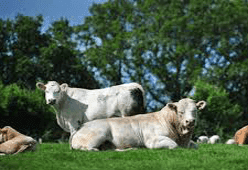Many people believe that raising cattle in a feedlot is inhumane. The truth of the matter is that feedlots are necessary in order to provide the world with the beef it is demanding. Cattle are usually raised on pasture for the first 12-18 months of their life. After this time, they are moved to a feedlot for anywhere from 3-6 months. This time in the feedlot is allowed for the animal to reach market weight. Misconceptions are that cattle raised in feedlots are not cared for properly. However, these cattle are fed a high-quality diet, treated in the best way possible, and are required to feed the world. Cattle raised in a feedlot environment are fed a very high-quality diet in order to gain the necessary weight. Many different strategies are used to keep the animals' health and well-being. Since 1975, Suraj Shree Chemicals Ltd. has been the highest quality cattle feed manufacturer and believes in offering a complete solution to farmers for all aspects of organic agriculture and always focusing on a zero-wastage approach.
Plant growth promoters have many advantages for crops
A plant growth promoter is a natural or herbal fertilizer, especially designed for the overall growth of plants. These are the substances that influence the overall health and growth of plants. Plant growth promoter aid in crop growth, final yield quality, and productivity, as well as the control of pests and pathogens. These promoters help in the growth of plants from root to leaf by regulating metabolic activities. Just as our body requires nutrients for growth, development and energy, just like plants also require the proper amount of light, water, oxygen, minerals and other nutrients for their growth and development. There are different kinds of growth promoters available in the market. Suraj Shree Chemicals Ltd. provides different types of growth promoters such as auxin, xide, fosom, agric lime, and neem kawach are the different types of growth promoters that Suraj Shree Chemicals Ltd. provides. These promoters all increase the fertility of the soil by controlling harmful pests and microorganisms. These promoters act as manures, enhancing soil fertility.
Plant protection products have great significance
Plant protection products play an important but indirect role in the regulation of soil erosion. The most widely practised measure to reduce soil erosion is a reduction or elimination of tillage of the soil surface. The connection between PPP and no-till is very strong. In no-till systems, herbicides are widely used for the suppression of weed growth before and after the crop is established as a replacement for weed control through tillage. Glyphosate is the main herbicide used for weed suppression in no-till systems, and neither it nor its major metabolite AMPA have been shown to have consistent negative effects on soil microorganisms. Management practises that reduce the amount of PPP applied to soils while maintaining plant production levels are an integral part of sustainable soil management.


Radha Raman is one of the best Trusted Animal Feed Manufacturer in India
ReplyDelete